Iowa’s Real Field of Dreams
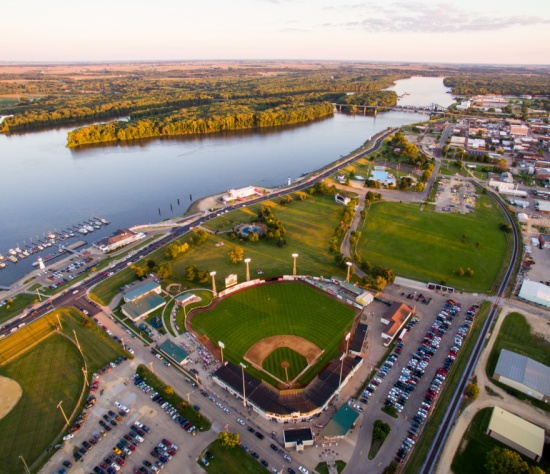
Riverview Stadium, Clinton, Iowa–built 1937.
CLINTON, IA..—The Clinton LumberKings hosted the Burlington Bees on Aug. 3 in their final home game of the 2021 Prospect League season. Both Iowa teams landed in the Prospect League, a collegiate wood bat league after Major League Baseball kicked them out of the affiliated minor leagues. Both teams have storied histories.
The Bees were members of the now-defunct Midwest League from 1962 until 2020. Their home field was built in 1947. The LumberKings were also members of the Midwest League from 1956 until 2020. They play in the historic Riverview Stadium (NelsonCorp Field), a 4,800-seat jewel of a ballpark built in 1937 by the WPA. Generations of families watched baseball at these intimate ballparks.
The teams are essential to the fabric of the community in Iowa. Burlington and Clinton are owned by the community. Baseball is as much a part of their identity as fields of corn. Uh-oh.
I wandered around NelsonCorp Field on Aug. 3, just nine days before the White Sox-Yankees “Field of Dreams” game in a Dyersville, Ia. cornfield. Dyersville is 90 miles northwest of Clinton. The LumberKings gift shop had a few racks of tee shirts discounted on its final day of the season. One section featured a tee shirt with a sepia-toned photo of Riverview with the caption, …the one constant since 1937 has been baseball in Clinton. Another nearby section has some older “Field of Dreams” tee shirts honoring the site of the 1989 Kevin Costner baseball fantasy movie. Those went untouched.
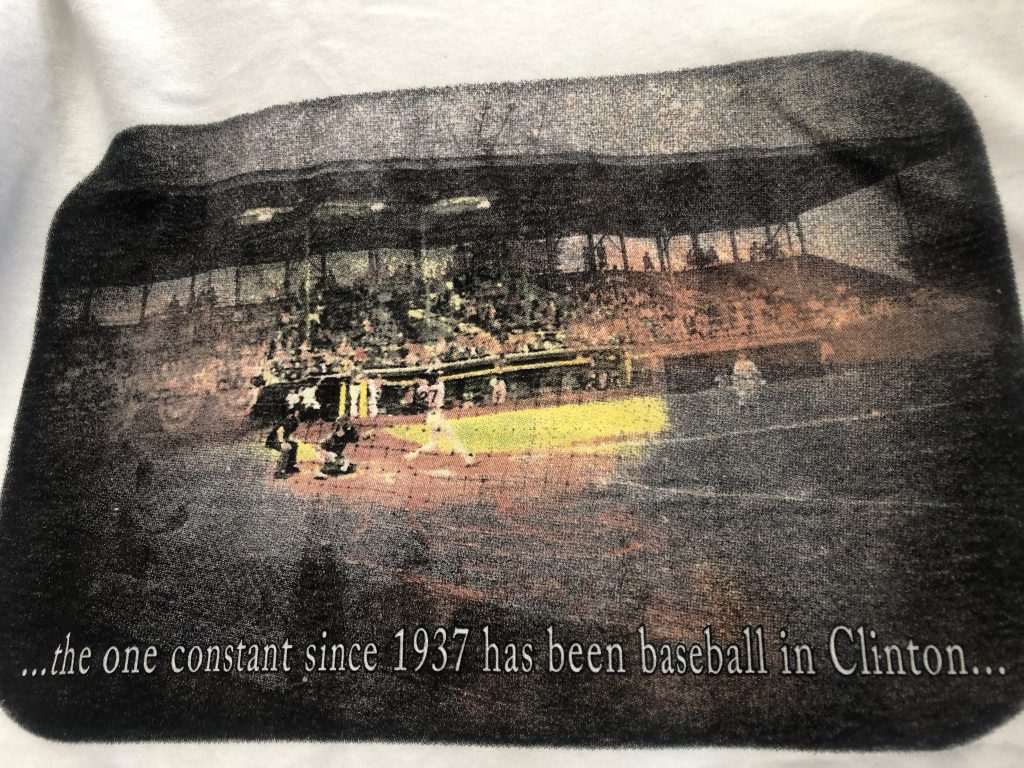
Most Clinton baseball fans said they will not watch the “Field of Dreams” game Thursday night on FOX TV. They’re hurt. Something they loved has been taken away. The old Riverview wasn’t big enough, pretty enough, and didn’t have the fancy facilities MLB wanted. But it does have history and purpose. NelsonCorp is just a country block from the Mississippi River. The Clinton Showboat Theater is a 1936 towboat that serves as a white centerfield backdrop. This is real Iowa.
“The Field of Dreams” field won’t even be played on farmer Don Lansing’s original field. MLB will parachute in the cornfields, put on a sentimental made-for-television event and leave town. The Clinton LumberKings will remain.
Clinton is the real “Field of Dreams.” People around Clinton (pop.25,000) know that true dreams are planted. They grow over time. They overcome hardships. Clinton fans saw players like Denny McLain, Orel Hershisher, Rod Beck, Steve Sax, and Ron Kittle come through town before they got rich and famous.
The Midwest League was always a little different and sweetly intimate. MLB aims to slap a corporate sameness to the minor leagues that they have accomplished with the major leagues. The old Midwest League is now called “The High-A Central” and someday MLB owners will snag naming rights for each league. The Cubs would love a “DraftKings Sportsbook League.”
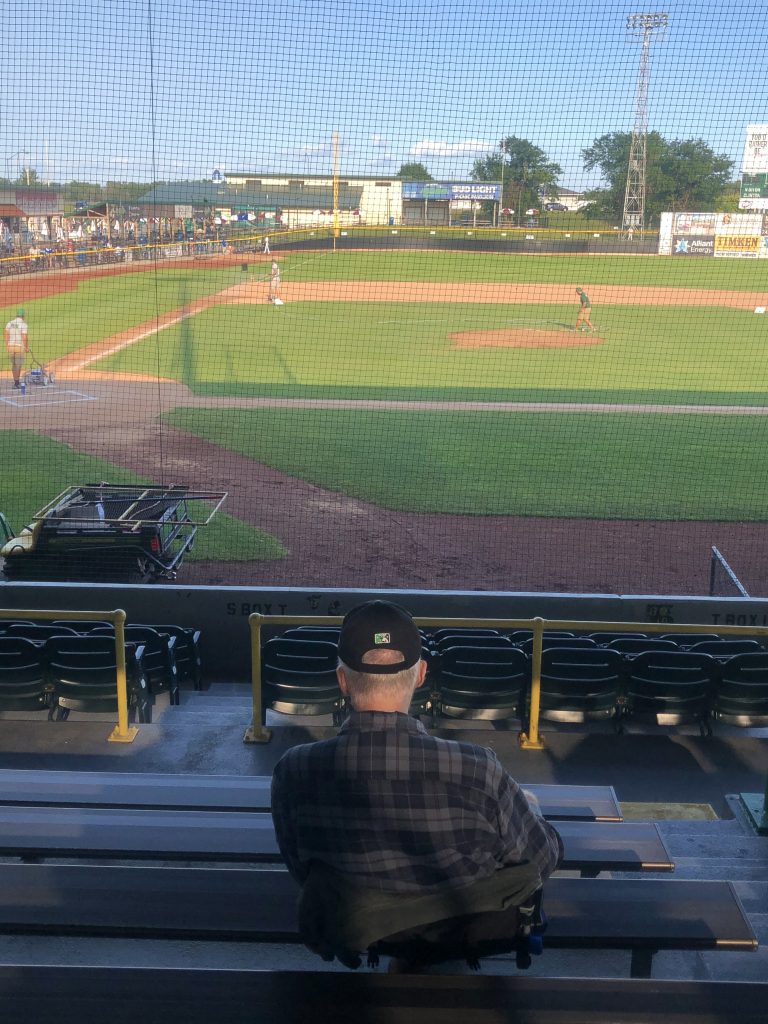
Clinton fan, 90 minutes before Aug. 3 game time. (D. Hoekstra photo.)
Ted Tornow just completed his 23rd year as General Manager of the LumberKings. He steered the team and the community through the pandemic’s lost season (2020) and then the transition to the Prospect League (2021). He doesn’t let many things get him down. His quote to live by is from Gordon Lightfoot’s “Carefree Highway”: “The thing I call living is just being satisfied with knowing I got no one left to blame.” On the last day of the season, Tornow stood by the gates and said goodbye to every fan. He wore his trademark khaki shorts and Hawaiian shirt.
The LumberKings beat Burlington 11-10 in a 10-inning game that clocked in at nearly four hours. It was not pretty. The contest featured nine wild pitches and eight errors. LumberKings pitchers included T.J. Fleita, the 20-year-old son of former Cubs Vice-President of Player Personnel Oneri Fleita. The LumberKings drew 4,663 fans on a “Fan Appreciation Night” with $2 tickets, $2 hot dogs, and $2 select beer options.
I’ve gotten to know Tornow over the years because I like to write about the LumberKings. I like underdogs. Here is my 2019 Clinton road trip story for New City in Chicago. Tornow has spent 38 years in professional baseball. He is a minor league baseball lifer. He is friends with the fun-loving baseball impresario Mike Veeck. Tornow’s office is filled with colorful tchotchkes like an empty Play Ball! bubble gum dispenser, broken game bats, and a Butte Copper Kings “Fun is Good” poster.
I caught up with Tornow around 4:30 p.m., two hours before the Aug. 3 game time. He had been at the stadium since 8:15 a.m. “We had a wild weekend,” he said. “We had RAGBRAI (the statewide bicycle race) coming through town. We made the playoffs. We don’t know if we will have a home game.” (The LumberKings won the Great River Division in an Aug. 5 road game at Normal and moved on to lose on the road to the Cape (Giradeau) Catfish in an Aug. 7 semi-final game.) It’s nuts. We’re doing a check presentation to the local United Way. We’ve done that for almost 20 years.
“For every home run hit at home, West Bend Mutual Insurance Company, which is our carrier, donates fifty dollars. Well, with a short season we hit maybe ten. So, $500, I said to West Bend, ‘Listen, I don’t care if I gotta’ pay it, it has to be $1,000. A thousand sounds better than $500 or $450.”
Despite how it looks, there is no ‘no’ in Tornow.
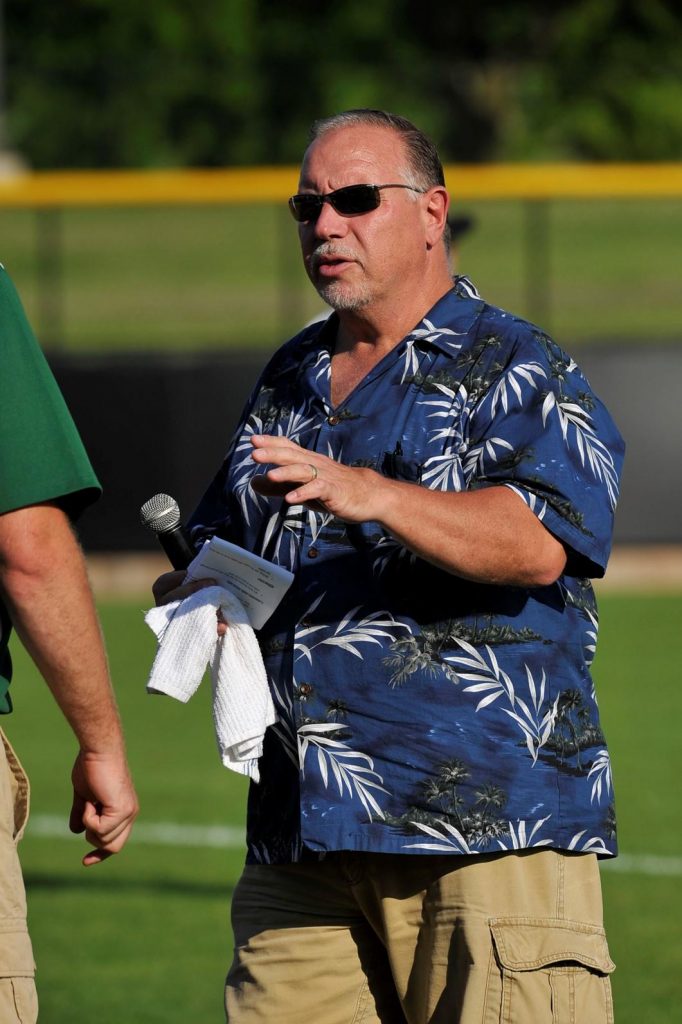
Clinton GM Ted Tornow (Courtesy of Clinton LumberKings.)
Tornow kept pushing through the cashiered 2020 season and the 2021 removal from MILB (Minor League Baseball) where they had been a Miami Marlins affiliate. “We never stopped,” he said. “We lose in the (Midwest League) finals in ‘19. The 2020 season is canceled. We go into survival mode. We had 20 concerts and college and high school games before COVID shut everything down. We did curbside concessions which was the impetus for doing the other things. Ballpark food. The Garbage Pails (The LumberKing’s specialty of waffle fries, onion rings, mini tacos, mini corn dogs, chicken strips, cheese balls, and jalapeno peppers) People went nuts for it. Then we officially got kicked out.”
Tornow was not surprised that MLB dropped Clinton, along with 39 other MILB affiliates in small to mid-sized American communities.
“We’ve been on their target list for years,” he said. “Rather than mope about it we wanted to be proactive. We investigated: The Frontier League. What budget do we need? The Northwoods League? The Prospect League? I put together a mock one with friends from the American Association (where the former Midwest League Kane County Cougars landed.). But between the Frontier and American Association, the two independents, I’m spending $150,000 on player salaries. I’m already a half million in debt. So it boiled down to Northwoods (another collegiate wood bat league) and Prospect. And Prospect had a little better feel to it.
“I didn’t know what to expect but this year has been one of the most pleasantly surprising personally and professionally of my career. Because people wrote us off. It was ‘The LumberKings are dead.’ The response this season blew me away. People came out and supported us. It’s comforting. It’s always great to be wanted. I kept saying, ‘We’re going to have baseball here next year’. Even some of the leaders of this community did not believe me.”
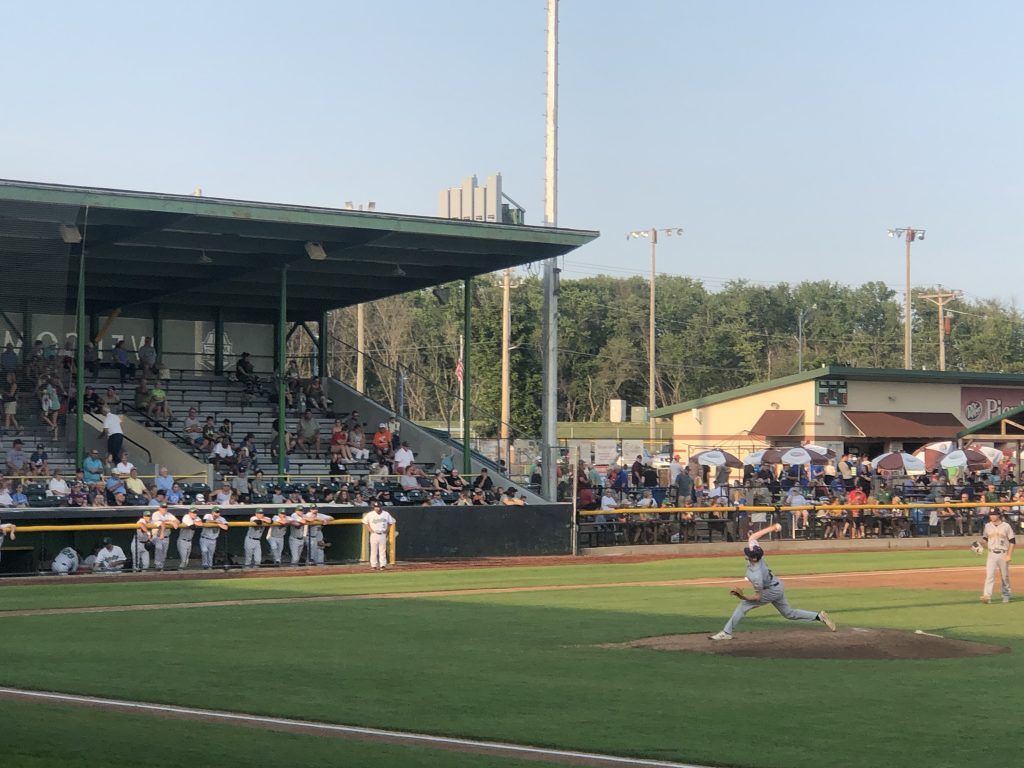
Aug. 3, 2021, the final home game of Clinton’s dream season. (D. Hoekstra photo.)
LumberKings board member Brian Kenney believed in Tornow. Kenney is a former high school English teacher who is the principal at Whittier Elementary School in Clinton. Kenney, 58, was born and raised in Clinton. His father John was a pipefitter at the old DuPont plant in Clinton and his mother Ursula was a nurse at Mercy Hospital in Clinton. They came to Clinton directly from Ellis Island.
“The LumberKings are one of the jewels of our community,” Kenney said in a conversation in the grandstands before game time. “People are valuing it more this year than I have seen.’ The LumberKings finished first in attendance in the 16-team league, averaging 2,329 people a game on a 27-game home schedule. In 2019–their last MLB affiliated season–they averaged 1,813 fans per game. The Prospect League season ends in early August as players head back to college.
“Fans don’t care that we’re not professionals anymore,” Kenney continued. “The kids are younger and smaller in stature. The hitting is stronger, of course with the wood bats. They’re more approachable to our fan base. There’s a level of exuberance the young kids show that the pros don’t. That’s not a put-down of the pros, but we had several walk-off wins this year and the kids just go bonkers. Towns our size just don’t have this anymore.”
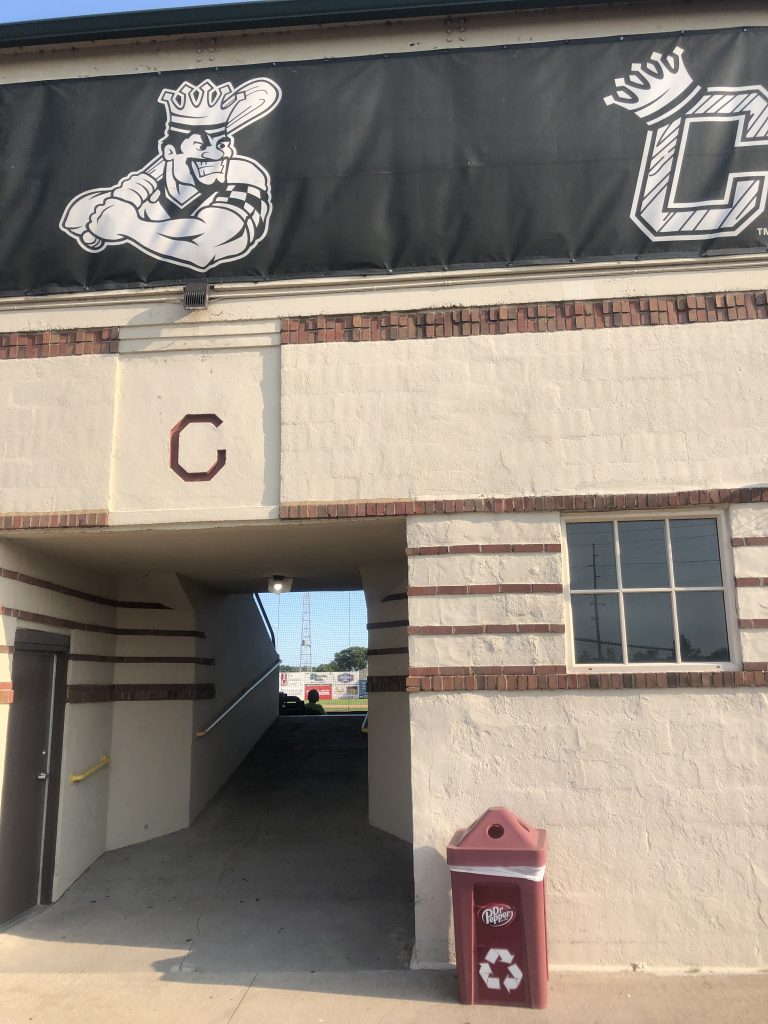
Clinton’s stairway to heaven.
The board heard the distant thunder of MLB’s contraction plan with the minor leagues. “But the rationale wasn’t what I expected,” he said. “I thought the rationale would be moving to bigger markets and bigger stadiums. But it appears to me that the commissioner’s M.O. is to minimize minor league ball to increase attendance at major league stadiums. I don’t think that will be successful because growing players is where you also grow your fans.
“Kicking us out is a commentary about America in a lot of ways. If baseball’s ever going to become America’s sport again it has to grow organically through places like this. I won’t watch the ‘Field of Dreams’ game. When it was first announced we thought about getting tickets, but we can’t afford it. My wife is a White Sox fan. I’m a Brewers fan.”
One of my problems with MLB is that baseball commissioner Rob Manfred is not a baseball fan. Manfred is a stooge for the owners. “So is (NFL commissioner) Roger Goodell,” Kenney said. “But Roger Goodell understands the business of football. I don’t think Manfred understands the business of baseball. But Ted never blinked with our situation. The city blinked, the community worried. But now, we have baseball.” Kenney looked around the late summer ghosts of the 83-year-old stadium and concluded, “I just enjoy taking all this in.” Keep this as an option next summer after MLB owners fail to reach an agreement with the player’s union on a new Collective Bargaining Agreement and MLB games go away for a while.
Tornow maintained a sense of normalcy in 2021. His five-person staff, including his wife Ruth, steered the course. The game program still features player’s backgrounds and Midwest League history. There were pocket schedules and giveaways (all things missing at Wrigley Field.) A Duke Slater bobblehead giveaway honored the Clinton High School graduate and University of Iowa graduate who was inducted into the Pro Football Hall of Fame last weekend. A Chicago native, in 1948 Slater was elected to the Cook County Municipal Court. He became the second Black judge in Chicago history. Slater was a two-way lineman who played in the NFL in the 1920s.
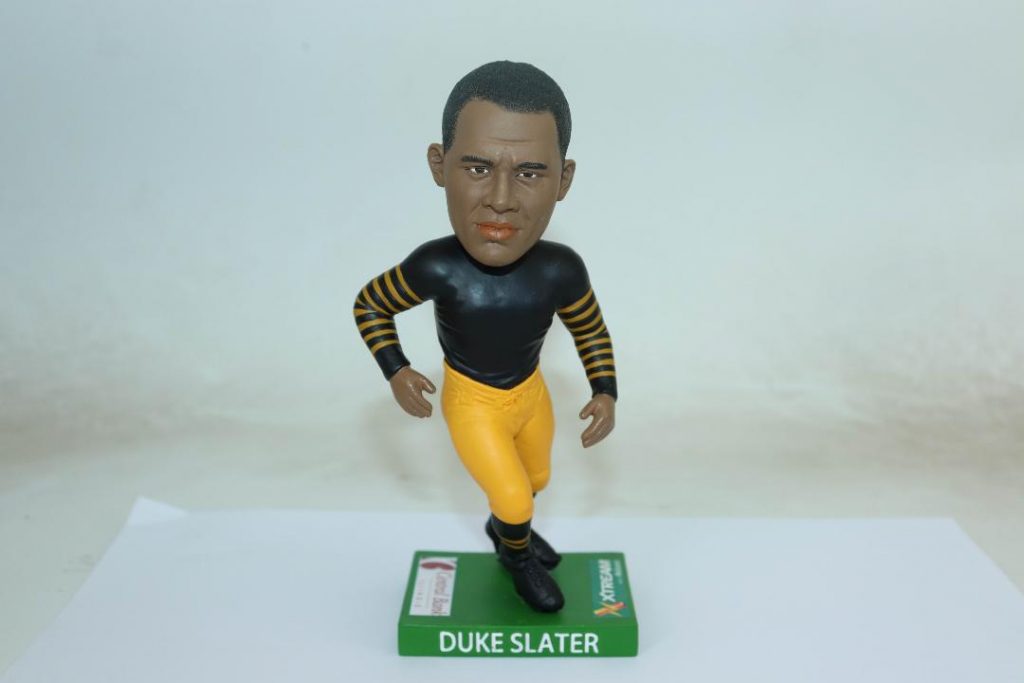
Duke Slater (1898-1966) Clinton hero, American hero (Courtesy of the Clinton LumberKings.)
After the game I ran into Jim Foster, the gregarious former NFL executive and founder and first commissioner of the Arena Football League. He was in the gift shop buying a LumberKings pennant. A 1972 graduate of the University of Iowa, Foster was taking in his first baseball game at Clinton. Foster also played minor league football for the Cedar Rapids Raiders.
“I was always told Clinton is the best example of an old, well-maintained ballpark in America,” said Foster, who lives with his wife Susie on the shores of the Mississippi River in nearby LeClaire, Ia. “Sports history has always been important to me. It was a great experience. I sat on the first base line maybe four rows up. All those people knew each other. It was small-town America at its best. As they were leaving, it was ‘Hey, Joe, you gonna’ get to work on time tomorrow?’ You don’t find that ambiance anymore. I’ve been in the pro sports business a long time. What Clinton and Burlington did to survive as long as they did was go to non-profit status and become community-owned teams. They made it work.” In 1979 the NFL hired Foster as a promotions manager after running minor league football teams.
“A lot of minor league sports organizations are going to have to go non-profit to survive long term, “ he said. “Because the bigger is going get bigger and the pie is going to get a lot smaller for minor league teams around America. And there are so many entertainment options in this country.” Ironically, Foster’s son Nile was doing the rigging at the Field of Dreams in Dyersville. He had just finished a rigging gig at Lollapalooza in Chicago.
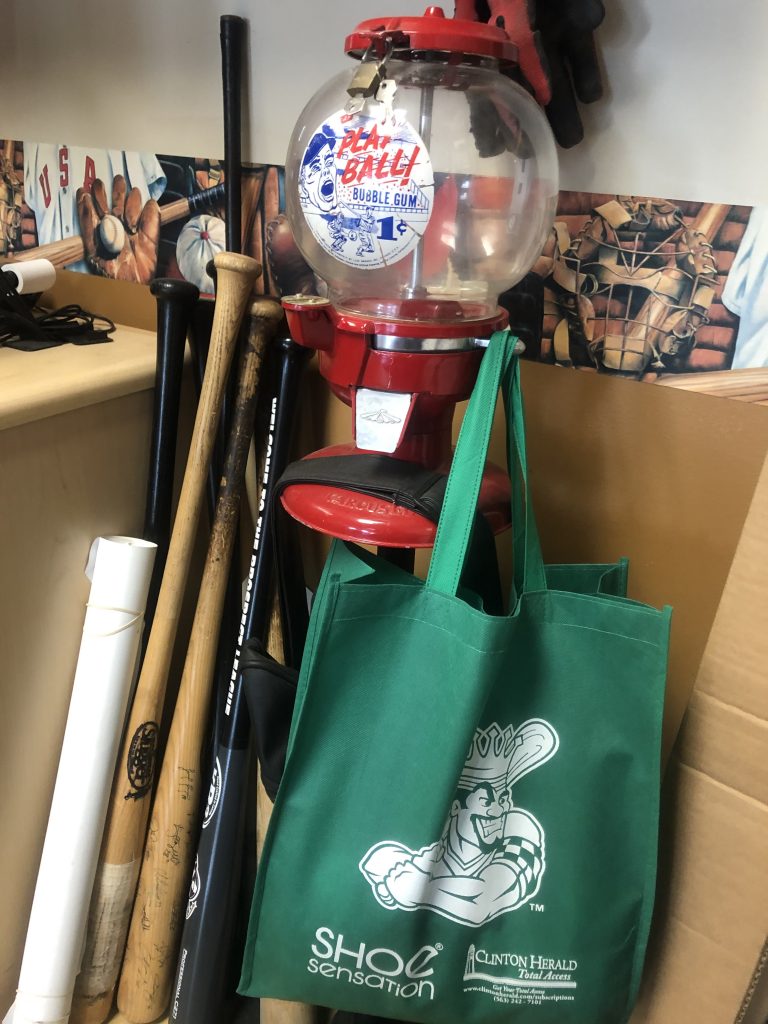
Ted Tornow’s fun office supplies.
LumberKing board member Paul Schnack operates the NelsonCorp scoreboard. “This is the real Field of Dreams,” he said as The Harry Simeone Chorale’s “It’s a Beautiful Day For A Ball Game” blared in the background. “When we had the (Midwest League) all-star game here one year we took the teams up to Dyersville. Before our (2006) renovations, us, Burlington, and Beloit (Wis.) were the bottoms.
“We were one of the smallest towns in minor league baseball so it was a short straw to begin with. I don’t want to say it was a power thing, but a community-owned team compared to some owners who have three or four teams—they might have a little more weight. I was hoping with the pandemic they would push back the deadline. They seemed to go right into it with no idea. It would have been nice to give us a farewell season.”
Schnack, 56, is a Clinton native and a banker by day. The youngest of eight children, he hung around the old stadium with his brothers. His father Ray owned a feed store in nearby Low Moor, Ia. and his mother Lois was a church secretary.
At the LumberKing games, Schnack faithfully keeps track of scoreboard balls and strikes from the small cement block and wood press box. He looked down the left-field line and said, “We put the beer garden out there in 2006. That’s where most people sit. You could ask them the score or inning and 90 percent wouldn’t know. Which is fine. It’s a social thing.”
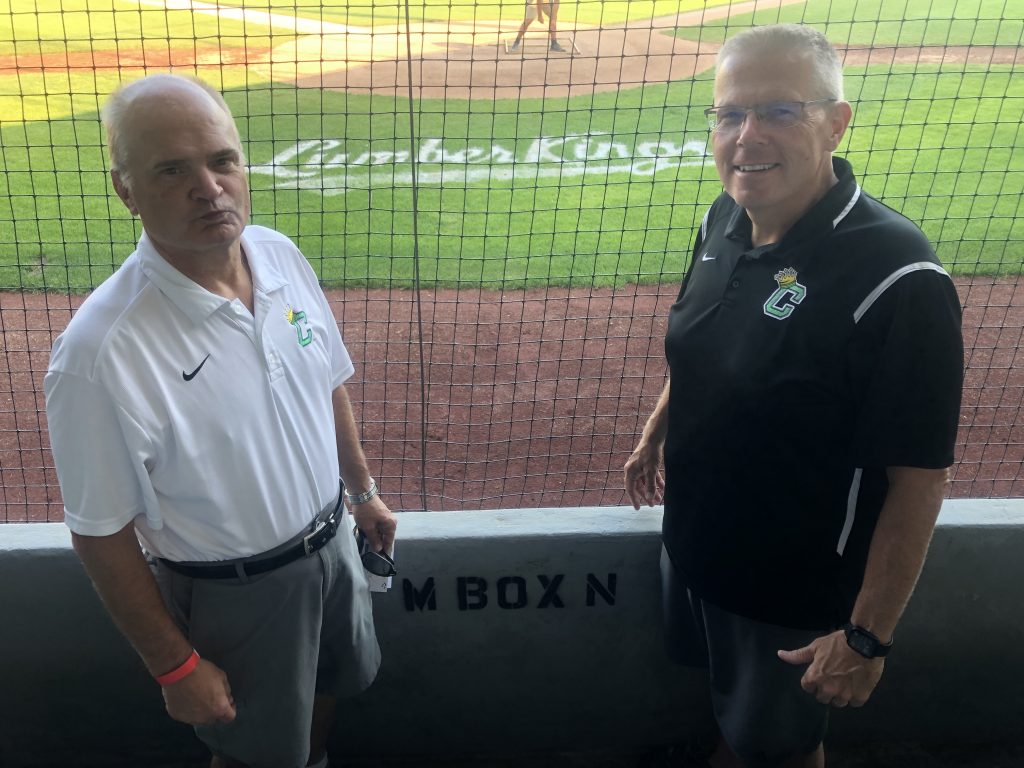
LumberKings board members Paul Schaeck (L) and Brian Kenney. (D. Hoekstra photo.)
Kenney figured he attended his first LumberKings game in 1969 when the team was affiliated with the Seattle Pilots (now Milwaukee Brewers.) “We grew up fairly poor,” he said. “My buddies and I would sit out in the parking lot. We’d gather the foul balls and bring them back in. The general manager at the time, Fritz Colschen, sometimes would buy the balls back from us for a quarter. This place means so much to people.”
One of his favorite memories is sitting in the grandstands when the 1978 made-for-television film “One in a Million” was filmed at Riverview. LeVar Burton portrayed Ron LeFlore, who rose from the Michigan prison system to play for the Detroit Tigers. “This place was packed,” he said. “After the game, LeVar Burton sat up on that dugout roof and signed autographs. We all knew him because we were assigned to watch ‘Roots’ in junior high school. All I could see was Kunta Kinte. He was very kind to all of us.”
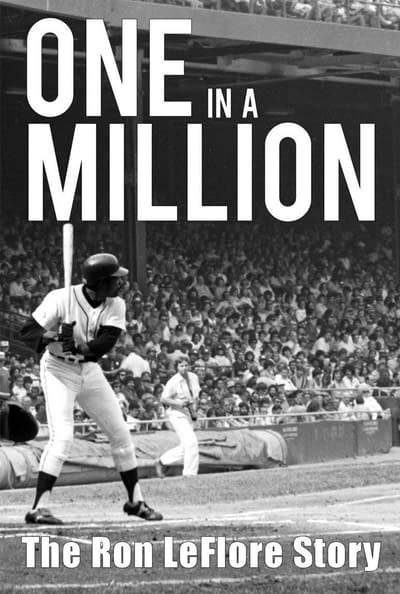
Tornow, 60, also has a memory for every moment in baseball. I mentioned the recent passing of Knox Phillips, the son of Sun Records rock n’ roll avatar Sam Phillips. In the late 1980s, Knox took me to my first Memphis Chicks games at the old Tim McCarver Stadium in Memphis. Tornow was the Chicks general manager of the team that used to be in the Southern League. Memphis is now a member of MLB’s “Triple-A East.”
At Memphis, Tornow’s sound system tech Kenny Whitehead also worked at the historic Ardent Studios in Memphis. Artists like Led Zeppelin, Big Star with Alex Chilton, and the early Stax acts recorded at Ardent. “The weird thing was that the speaker system was about eight feet off the ground in dead center field,” Tornow said. “Remember that? Kenny put all the woofers and tweeters up there. They had an anniversary party at Ardent. Kenny invited me. John (Fry, Ardent owner) was there. We went into something of a mediation garden in the center of the building. That’s where I bumped into (ZZ Top’s) Billy Gibbons and Dusty Hill.”
MLB is trying to shape a minor league system of sharp-dressed men. They had to build the new 8,000-seat Field of Dream$ to meet MLB specs. Down the road, more than 20 youth baseball fields will be built near the site and KCCI-TV in Des Moines reported that a hotel is planned.
In 2006, NelsonCorp underwent a $4.2 million renovation just to keep its stadium up to date. Schnack looked around his beloved field of dreams and said, “After we had our renovation our affiliates were positive about our facilities and the clubhouse. Things changed. But at least now we don’t have minor league baseball hanging rules over us.” Baseball was in the air as it always was. And with every crack of the wooden bat you heard the promise of tomorrow.

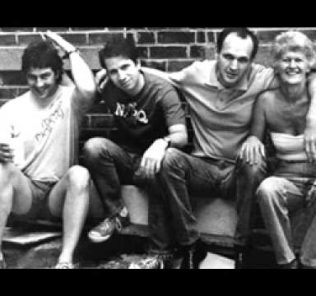


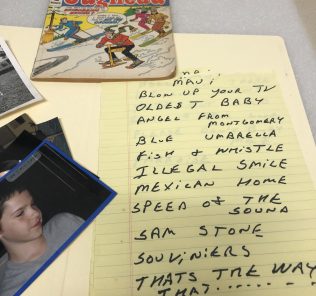
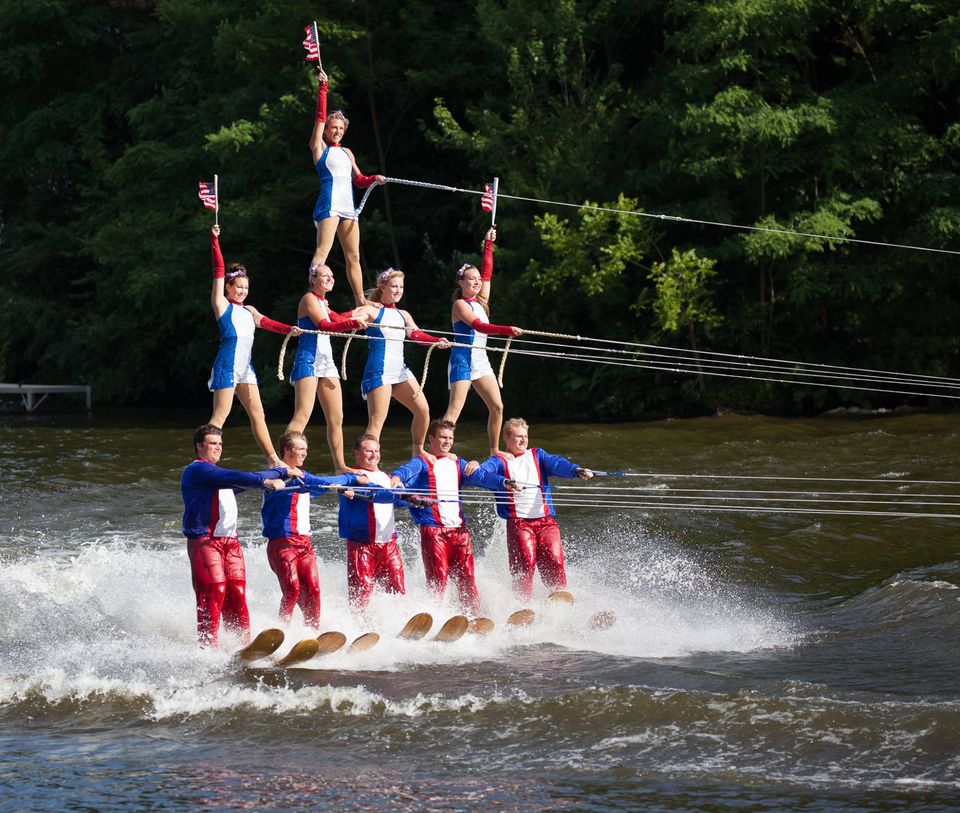



I really enjoyed this article!
Thank you.
We attended a Lumberkings baseball game in 2013. We always talk about going back. We will get there!
We live in Strawberry Point, and boated down the Mississippi to Clinton, stayed overnight and boated back..
It was a fun game: Start Wars Night! We had our photo taken Auth Darth Vader, LOL!
There’s nothing like attending a baseball game in an awesome stadium and the Lumberkings have one.
Thanks for the feedback, Laura.
I now include Clinton in my annual summer baseball junket. Check out the supper club on the Mississippi River. Travel safe, Dave.